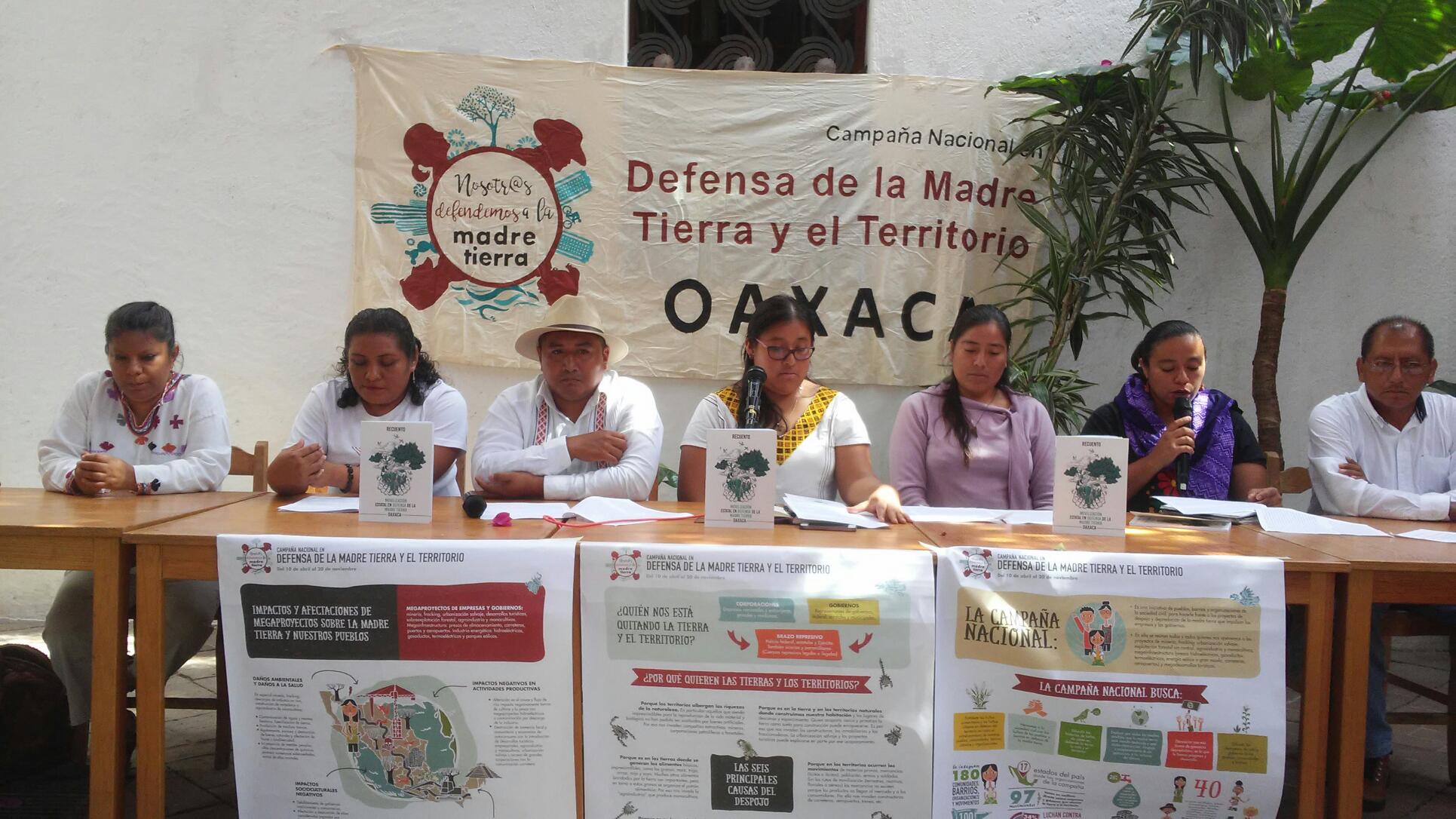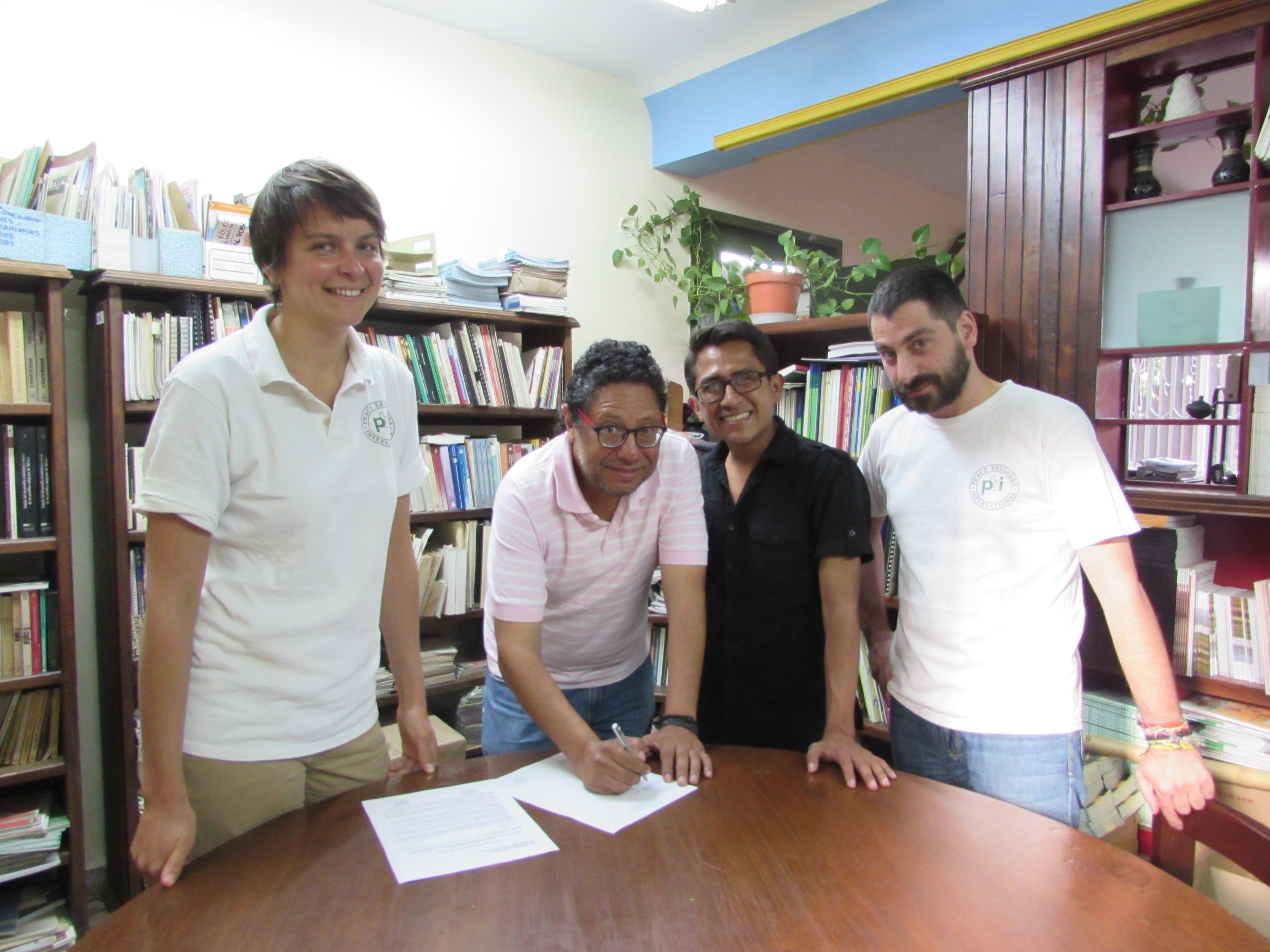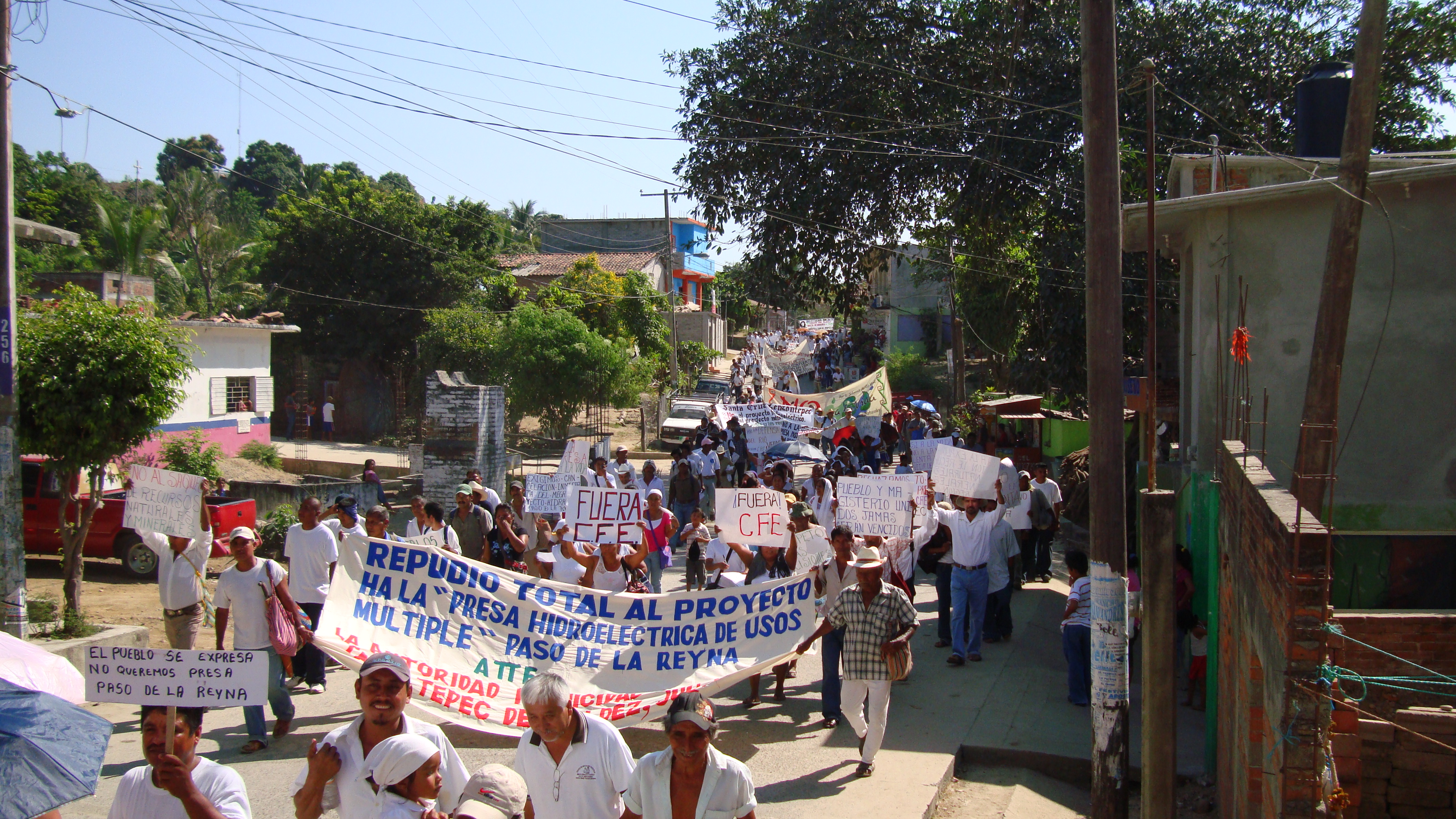EDUCA, Services for an Alternative Education was created in 1994 and is based in the City of Oaxaca de Juarez. Through its work in the area of territorial rights, it strives to strengthen and consolidate the leadership of social, regional and community organizations that fight for the defense of their right to territory. It also strives to make alternative proposals to current development policies. EDUCA aids in several community processes for the defense of the territory before mega-projects of exploitation of natural goods for the generation of energy and the extraction of minerals. Both its members and the supporting community defenders have suffered harassment, threats and defamation towards their work.
Marcos Arturo Leyva Madrid is the founder and director of EDUCA. Neftali Reyes Mendez works in the field of territorial rights. They both tell us that for communities "defending life is to defend everything it represents: the river, the minerals, the forests, their houses, their dead".
 Oaxaca is one of the states with the highest levels of poverty, biodiversity, and with an important ethnic and cultural pluralism. 45% of the land in the state is communal property, and historical conflicts over land boundaries have been exacerbated by the sale and speculation of communal and ejido lands after the constitutional reform and after the amendment made to article 27 of the constitution. For many organizations, the promotion of mega-projects and tourist or industrial corridors related to the implementation of the Puebla-Panama Plan has increased this conflict. The Network of Those Affected by Mining (REMA) ranked the state as the second in the country in terms of the number of social mobilizations against mining; and according to data from EDUCA, the Ministry of the Economy reported 407 mining concession titles in force in 2016, covering an area that represents 5% of the state. The energy matrix and the structure of the energy sector in Mexico are also of concern to civil society, because for them it would represent a setback in terms of the Rights of Indigenous Peoples and Human Rights.
Oaxaca is one of the states with the highest levels of poverty, biodiversity, and with an important ethnic and cultural pluralism. 45% of the land in the state is communal property, and historical conflicts over land boundaries have been exacerbated by the sale and speculation of communal and ejido lands after the constitutional reform and after the amendment made to article 27 of the constitution. For many organizations, the promotion of mega-projects and tourist or industrial corridors related to the implementation of the Puebla-Panama Plan has increased this conflict. The Network of Those Affected by Mining (REMA) ranked the state as the second in the country in terms of the number of social mobilizations against mining; and according to data from EDUCA, the Ministry of the Economy reported 407 mining concession titles in force in 2016, covering an area that represents 5% of the state. The energy matrix and the structure of the energy sector in Mexico are also of concern to civil society, because for them it would represent a setback in terms of the Rights of Indigenous Peoples and Human Rights.
The Mexican Commission for Dialogue with Indigenous Peoples ranks second in the nation for mega-project related conflicts. In 2014, indigenous peoples, communities and organizations in the state met and identified significant threats to their territory from diverse interests that would seek to control them; in the face of the violation of the human rights of those who defend the territory; and in the face of the reforms, such as proposed reforms to Agrarian Law, the Telecommunications Reform and the Education Reform stand out. Last year, the problem was aggravated by the creation of Special Economic Zones, promoted by the government with the objective of shortening gaps between territories by creating new separate areas of development, and which have been viewed with concern by civil society, due to their possible consequences on the militarization of the territory and the imposition of development projects.
"Neither the organizations nor the communities are against the projects, or against the investment processes, the concern is due to the type of investment in question, whom it benefits and who it harms". EDUCA points out the importance of communities being part of the investment processes and that these should reflect their regional identity and vision, and aspirations for improvement in the quality of life within the communities. "Nowadays, there are investment projects or mega-projects that do not respect the community, the environment, or the right of people to decide whether or not they want this type of projects.” Because of these circumstances, the people or communities that defend their rights become community defenders.
 Difficulties in exercising the right to defend human rights
Difficulties in exercising the right to defend human rights
Marcos: One difficulty encountered by human rights defenders has to do with the fact that investment projects are often installed without the consent of the community, and to maintain the community more or less under control, pressure is exerted upon it, often through of armed groups that harass those who create the processes of defense and opposition. Another problem is the local cacique system, since the cacique’s economic and political power in the region is threatened with the work of those who defend the territory. In addition, there are criminalization processes for defenders that try to link them to criminal actions. There is a series of crimes that are regularly attributed to almost all activist defenders, the sole fact that you do something in response, that you walk in the street in a demonstration can be used to prosecute you for the crime of attacks against the public byways; if you take an office and do not let a person out, authorities say it’s kidnapping. The use of these crimes is arbitrary, the State uses them to file a criminal action against defenders. There are also communication strategies, media campaigns used to discredit by accusing them of not being defenders, but criminals; accusations of embezzlement of funds, or of defending a certain criminal gang.
Neftalí: I think another problem is that companies provide financing (for projects), but they are never directly involved, so the strategy they have used is the creation of a civil association that defends and promotes the project within the community. Said association begins to generate opinions favorable to the company, and begins to divide the social fabric. On the other hand, there is the arrival of paramilitary groups or armed groups, where it is very difficult to establish the link between the company and these violent groups and the associations they have created. This pattern occurs throughout the country and is one of the most important points, because we have few tools to hold the company accountable; there is no mechanism that requires companies to respect human rights. In addition, there is impunity in the aggressions towards defenders while the same justice system criminalizes them. These are the two sides of the same coin, and this is a very serious problem in several of the cases we accompany.
Responsibility of non-state parties and public development policies
Neftalí: Companies are playing a very important role in community social divisions. They do not get involved directly, but they demand that the State repress, not the entire state, but certain parts or officials. In addition, private investment is favored along with this type of projects; the law of Special Economic Zones is an example of that. Each time there is a stronger separation between the decisions made by the State towards a certain work or certain public activity, and what the public is thinking of as an alternative, as a route, as a solution. This situation is clearly seen in the laws of the Special Economic Zones, where a private, economic sector is privileged and on the other hand the citizenry is left totally unprotected.
Marcos: It seems to me that we are already seeing the signs, especially in the issue of economic zones in Oaxaca, and it has to do with giving "security to investments", which translates precisely into a greater military and police presence in these places. On the other hand, opposition movements are also perceived in the processes of criminalization, and this is being translated into media campaigns, which pit one part of society against another, in order not to generate organized and social processes for the defense of the territory. These are the same threats that we saw in the eighties and nineties, with disappearances, murders, torture, death threats, office raids. Now what we see is the intensity of these aggressions that come both from the government and from transnational companies.
 Continuity of opposition, actions taken by the community
Continuity of opposition, actions taken by the community
Neftalí: Many communities still have a community life where the Assembly plays an important role in decision-making, in informing people. The process of opposition is a collective process where access to information to make a decision about communities plays a pivotal role. In addition, whether they are agrarian communities or ejidos, communities maintain a very strong relationship with other neighboring communities thanks to parties or exchanges, which generates the construction of networks of communities in defense of territory. This is the basis for a series of strategies in which local, state and national filing of accusations plays a very important role; as does the documentation of rights violations, of aggressions or of the problem; and the social mobilization, not only demonstrations, but the social mobilization in the sense that the community begins to mobilize, to inform itself and to talk about the issue, in the sense that the community generates an assembly or a forum, and begins a series of actions for that defense.
Marcos: We start from the premise that there is no territorial defense if there is no local subject that conducts it. Our task is to create a collective subject; in Oaxaca we still have organized communities, either through their municipal, agrarian, or communal authority or a committee. There are communities to which these opposition processes have helped to have a new relationship with the territory, as in the case of Paso de la Reina, where, for 10 years, adults, young people, boys, and girls have rediscovered the meaning of the river in their community life. EDUCA cannot transform reality alone, we have to join with others and generate processes of cooperation.
This article comes from our most recent publication, "In Defense of Life"

